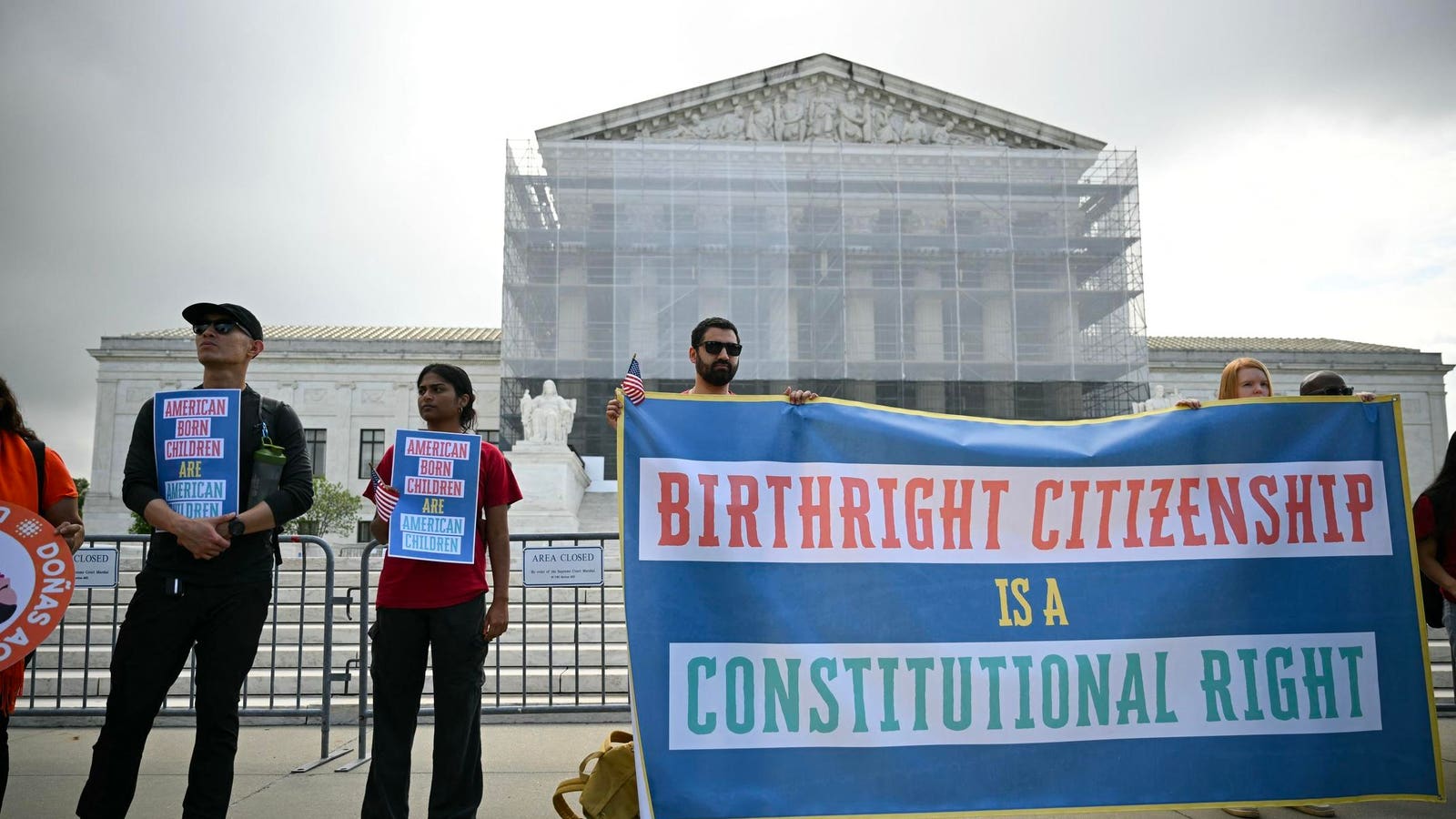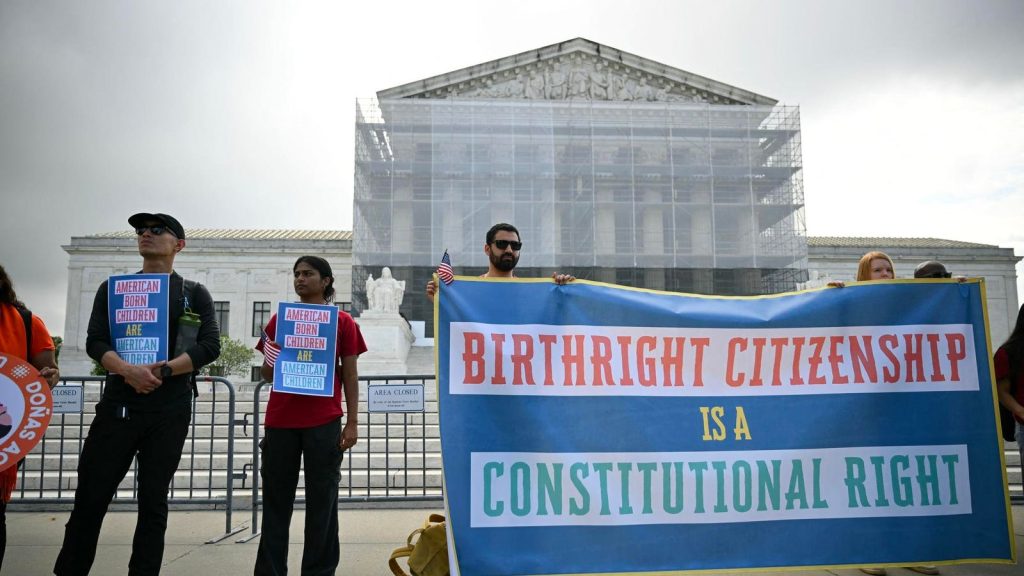President Donald Trump has a net negative approval rating in six of seven polls taken in the wake of his sweeping tariff announcement on April 2—though most Americans don’t think Trump will stick with the new levies, according to one survey.
April 14-7 net approval rating: Trump’s approval rating dropped to a new low for his second term in Morning Consult’s weekly poll, with 45% approving of his job performance and 52% disapproving (the poll of 2,203 registered voters was taken April 11-13 and has a 2-point margin of error).
On trade, Trump has a net -5 approval rating, and 24% of respondents said it’s a top priority for Trump, though only 48% think it should be.
April 14+2: Representing an outlier in polls taken since Trump’s April 2 tariff announcement, Harvard CAPS/Harris found 48% approve of Trump’s job performance and 46% disapprove, a seven-point decline in his net approval rating compared to the groups’ February poll and a two-point decline since March (the latest survey was taken April 9-10 among 2,286 registered voters and has a 1.9-point margin of error).
Voters’ perceptions of the economy as a whole are largely unchanged since January, even though a greater share, 45%, say their financial situation is getting worse, compared to 41% in the groups’ previous survey in March—while Trump’s handling of inflation, and tariffs and trade policy, had the worst approval ratings, both at 41%, of eight issues the poll asked about.
April 14-7: A University of Massachusetts poll of 1,000 U.S. adults conducted April 4-9 by YouGov found 51% disapprove of Trump’s job performance, while 44% approve (the poll has a 3.7-point margin of error).
Trump received his worst approval rating of six issues the poll asked about on inflation (33%), followed by trade (36%), civil rights (36%), jobs (38%), foreign affairs (39%) and immigration (50%).
April 13-6: More than half, 53%, of the 2,410 U.S. adults who responded to an April 8-11 CBS/YouGov poll said they disapprove of Trump’s job performance, compared to 47% who approve (margin of error 2.4 points), a dip in Trump’s rating since the groups’ March survey that found equal shares of Americans approve and disapprove.
The poll also found 58% oppose and 42% favor Trump’s new tariffs on imported goods, but 51% like his goals for the tariffs—to return manufacturing jobs to the U.S. and decrease the import/export margins between the U.S. and its trading partners, he has said—though 63% dislike his approach for achieving those goals.
More Americans, 59%, believe Trump is using the new tariffs to negotiate with other countries and will remove them later, compared to 41% who think he’ll keep them permanently.
April 9-12: Trump’s disapproval rating stayed stagnant, at 53%, in the latest Quinnipiac University poll taken April 3-7 among 1,407 self-identified registered voters, though his approval rating decreased one point, to 41%, compared to the group’s previous survey taken in March (the shift is within the poll’s 2.6-point margin of error).
The poll found the majority of voters (72%) think Trump’s tariffs on all U.S. trading partners would hurt the economy in the short-term, while 53% said they believe the policy would hurt the economy in the long-term.
April 9-8: A new Economist/YouGov survey taken April 5-8, after Trump’s sweeping tariff announcement on April 2, found 51% disapprove of his job performance, compared to 43% who approve, a five-point swing since the groups’ previous survey taken March 30-April 1 (the latest survey of 1,741 U.S. adults has a margin of error of 3.1 points).
April 7-6: Representing the lowest rating of his second term in Morning Consult’s weekly poll, 46% of registered voters surveyed said they approve of Trump’s job performance, compared to 52% who said they disapprove (the survey of 2,207 registered U.S. voters was conducted April 4-6 and has a margin of error of 2 points).
Trump’s net approval rating on trade also declined to -3, down from +13 just after taking office in January.
April 2-8: A Marquette Law school poll found Trump has a 46% approval rating and a 54% disapproval rating (the survey of 1,021 U.S. adults was taken March 17-27 and has a margin of error of 3.5 points).
The majority, 58%, of respondents said they think tariffs hurt the economy, while 28% said they help and 14% said they don’t make much difference—as Trump has imposed new tariffs on Canada, Mexico and China, steel aluminum and auto imports, and is expected to announce a new round of reciprocal tariffs against U.S. trading partners Wednesday, which the White House is referring to as “Liberation Day.”
March 31-3: Half of the 2,210 registered voters surveyed by Morning Consult March 28-30 (margin of error 2) said they disapprove of Trump’s job performance—a one-point improvement since the group’s survey last week—while his approval rating stayed at 47%.
Trump had a net -2 approval rating on trade in the Morning Consult poll (45% approve vs. 47% disapprove).
March 31-14: More than half, 56%, of 1,229 U.S. adults surveyed March 20-24 by AP-NORC said they strongly or somewhat disapprove or lean towards disapproving of Trump’s job performance as president, while his net approval rating totaled 42% (the poll has a 3.9-point margin of error).
When asked about Trump’s handling of trade negotiations with other countries, 60% said they strongly or somewhat disapprove or lean towards disapproving, including 27% of Republicans, 68% of independents and 89% of Democrats.
March 30Even: A CBS/YouGov poll found equal shares of the 2,609 U.S. adults surveyed March 27-28 approve or disapprove of Trump’s job performance (margin of error 2.3), while 55% said he is focusing “too much” on putting tariffs on goods from other countries and 38% said it’s the “right amount” of focus.
March 25+2: Trump’s net approval rating ticked up two points in an Economist/YouGov survey conducted March 22-25, compared to the group’s previous poll taken earlier this month, with 48% of 1,600 U.S. adults surveyed saying they approve of the president’s job performance, compared to 46% who disapprove (the poll has a three-point margin of error).
Trump’s approval rating improved despite the vast majority (74%) of 5,976 U.S. adults polled by YouGov online Tuesday in a separate survey calling the leak of military plans to Atlantic editor-in-chief Jeffrey Goldberg a “very serious” or “somewhat serious” problem, including 60% of Republicans (the poll has a two-point margin of error).
March 25-6: More than half, 51%, of 1,030 U.S. adults surveyed by Reuters/Ipsos from March 21-23 (margin of error 3) disapprove of Trump’s job performance, compared to 45% who approve .
The poll also asked respondents whether presidents should obey federal court rulings amid the administration’s battle with a federal judge who suspects it may have defied his order to halt deportations of migrants to El Salvador carried out under a special wartime authority known as the Alien Enemies Act: 82% of respondents said the president should obey court orders, including majorities of both Republicans and Democrats.
The vast majority of Republicans said the deportations were an exception, however, with 76% agreeing with the statement “the Trump Administration should continue to deport people they view as a risk despite the court order,” compared to 8% of Democrats who agreed with the statement.
March 24-4: Morning Consult recorded a record high disapproval rating of 51% for Trump and a record-low approval rating of 47% for his second term in its March 21-23 survey of 2,210 registered voters (margin of error 2), a two-point net decline for Trump since the group’s previous weekly poll.
In another first for Trump, more voters (47%) disapprove of his handling of the economy than they approve (46%), the poll found.
March 19-4: A March 7-11 NBC News poll of 1,000 registered voters found 47% approve of Trump and 51% disapprove (margin of error 3.1).
More registered voters (43%) believe the president and the executive branch have too much power versus the share who said the same about the Supreme Court and the judicial branch (28%), findings that come as the Trump administration is testing the judiciary’s authority in multiple cases, including over his mass firings of federal workers and use of an obscure wartime authority to deport people.
The majority of voters, 51%, have a somewhat or very negative view of top Trump advisor Elon Musk, according to the findings, while 39% have a somewhat or very positive view.
March 17-2: For the first time in Trump’s second term, he had a net negative approval rating in Morning Consult’s weekly poll of 2,210 registered voters taken March 14-16 (margin of error 2), with 50% saying they disapprove and 48% saying they approve.
March 13-8: Trump’s approval rating has stayed at 44% in the past four Reuters/Ipsos polls, including the latest online survey of 1,422 U.S. adults taken March 11-12 (margin of error 3), with 52% saying they disapprove of his job performance.
The poll also found 56% of respondents, including 27% of Republicans and 89% of Democrats, said Trump is too closely aligned with Russia—as Trump has openly criticized Ukrainian President Volodymyr Zelenskyy and briefly paused aid to Ukraine in its war with Russia as the U.S. pushes for a ceasefire agreement (the poll was taken before Trump’s March 18 call with Putin).
March 13 -11: A March 6-10 Quinnipiac University poll of 1,198 registered voters (margin of error 2.8) found Trump’s approval rating has declined since its previous poll released Feb. 19, when his approval rating was a net negative 4—the latest survey found 53% disapprove of the way he’s handling the job and 42% approve.
The majority of voters (54%) disapprove of Trump’s handling of the economy, while 41% approve and 5% offered no opinion.
March 12Even: The same share of voters, 47%, either approve or disapprove of Trump’s job performance, according to a March 9-11 Economist/YouGov survey of 1,699 U.S. adults (margin of error 3).
March 11+2: An Emerson College survey taken March 8-10 of 1,000 registered voters (margin of error 3) found Trump’s disapproval rating increased two points, while his approval rating decreased one point, from the group’s previous poll taken a week prior, but more voters (47%) still said they approve of his job performance than disapprove (45%).
The share of registered voters who say they identify with Trump’s Make America Great Again movement has increased sharply during Trump’s second term, according to NBC polling. A total of 36% of 1,000 registered voters polled March 7-11 said they consider themselves part of the MAGA coalition, compared to a 23% average in NBC’s March polling and 27% in the network’s 2024 polls (the most recent poll has a 3.1-point margin of error).
A significant share of Americans lack a basic understanding of tariffs, according to a Reuters/Ipsos poll that found less than half support universal tariffs, but favor targeted tariffs on countries “taking advantage” of the global trade system. The survey of 1,027 U.S. adults taken April 4-6 found 32%, including 19% of Republicans, 49% of Democrats and 30% of independents, incorrectly believe tariffs “are taxes paid by the country exporting the goods.” Less than half of all respondents (39%) support Trump’s 10% tax on all U.S. trading partners, on Canadian imports (35%), imports from Mexico (39%), and 25% global tariffs on imported cars (35%). There was a stark partisan divide in the sentiment—at least 70% of Republicans said they support all four taxes, compared to about 10% of Democrats. However, 76% overall said they support tariffs aimed at countries that “have been taking advantage of the U.S.” on trade.
45%. That’s Trump’s average approval rating so far during his second term, higher than his 41% average approval rating throughout the duration of his first term, according to Gallup.
Trump announced a new slate of tariffs against all U.S. trading partners on April 2, sending stock markets in the U.S. and abroad into a tailspin, fueling recession fears and prompting some of his allies in the business community to speak out against the policy. A 10% baseline tariff on all countries took effect April 5, and steeper rates for countries the U.S. runs a trade deficit were briefly imposed Wednesday, until Trump announced a 90-day pause for all countries except China. Trump’s April 2 tariff announcement largely quieted the media frenzy surrounding the leak of U.S. military attack plans to Atlantic editor-in-chief Jeffrey Goldberg, what was widely considered to be the first major blunder of his second term. Trump’s tariff war with U.S. trading partners, and his efforts to slash the federal workforce with the help of the Musk-led Department of Government Efficiency, have largely consumed his first two months in office. Other major moments include his explosive Oval Office meeting with Zelenskyy in which he and Vice President JD Vance berated the Ukrainian president in front of the media and his use of the Alien Enemies Act of 1798 to deport migrants. The latter, along with the mass firings that have taken place across dozens of government agencies, have prompted numerous legal battles that have led to accusations the Trump administration has defied court orders, sparking debate about the judiciary’s authority over the executive branch.











